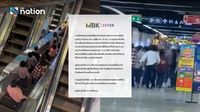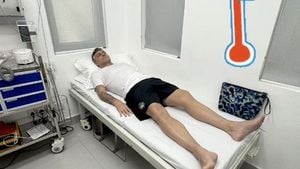On Saturday afternoon, March 22, 2025, Bangkok's MBK Center, located at the bustling Siam Square, was once again the scene of chaos as rival university students engaged in a violent confrontation. The incident, which unfolded at the food court on the sixth floor around 7:15 PM, resulted in five injuries, with two students suffering serious stab wounds requiring intensive care at a nearby hospital. This latest clash comes just 18 months after a tragic shooting at the Siam Paragon mall that left three dead and follows a troubling history of similar incidents at MBK Center.
Shopping malls are typically places of leisure and community, but MBK Center, renowned for its vibrant shopping experience, has repeatedly become a battlefield for students from Rajamangala University of Technology's Uthenthawai Campus and Pathumwan Institute of Technology. These institutions, located near the Pathumwan intersection, have seen their students meet in public spaces, including the popular MBK Center, which seems inadequately policed despite its significance as a tourist hotspot.
Witnesses described the frightful scene that ensued during the brawl, with panic rippling through the food court as onlookers scrambled for safety. MBK Center staff confirmed that a loud noise heard during the melee, initially reported as gunfire, was actually caused by a metal advertisement panel falling to the ground. This clarification was necessary as videos of the incident spread quickly on social media, igniting concerns regarding public safety in one of Thailand's premier shopping destinations.
Despite the longstanding issues of violence associated with rival student factions at MBK, the response from the government has been seen as insufficient. Following Saturday's violence, Higher Education Minister Supamas Isarabhakdi announced on March 23 that she would request the Royal Thai Police to enhance security measures in high-risk areas, particularly shopping malls. She emphasized the need for a robust response to prevent such violent incidents, which detract from the enjoyment and safety of the general public. "The incident is unacceptable. It was aggression and caused trouble to general people. Of course, there must be better action to prevent such incidents and punish wrongdoers, not only from the two institutions but also from all higher education institutions," she stated. This statement underscores the urgency felt by authorities to tackle what is perceived as a growing crisis.
In a city where tourism plays a vital role in the economy, incidents of violence such as this can have a dire impact on visitor perceptions. With the U.S. Department of State having issued a travel advisory just two weeks prior to the incident warning about possible safety risks in Thailand, the government faces mounting pressure to act decisively. Thai authorities had already taken measures in response to past incidents, notably allocating 50 million Baht to assist foreign tourists involved in accidents, with up to 1 million Baht coverage per incident under a scheme set up after the Siam Paragon shooting. However, such measures may seem inadequate in the face of ongoing insecurity.
The student clashes have not only led to injuries, including serious ones, but they have also created an atmosphere of fear among shoppers and tourists alike at MBK Center. Police believe that, although the conflicting student groups may arrive in small numbers, they often converge inside the center, escalating tensions rapidly. The Pathumwan police reported that four students were arrested following Saturday's altercation, while security measures at the mall are now under scrutiny, with calls for thorough checks for weapons upon entry.
Minister Isarabhakdi's comments reflect a broader concern from various segments of society regarding the management of student behavior. "Educational institutions are places of learning, not violence. I insist I will do whatever it takes to have the problem solved seriously and sustainably," she affirmed. Yet, questions linger regarding how effectively these measures will be implemented and whether they can genuinely deter future outbreaks of violence.
In reviewing the string of violent incidents tied to these student factions, it is difficult not to arrive at the conclusion that greater accountability must be enforced at both institutional and governmental levels. While the police and mall officials are working together to improve security, significant effort will be required to address the complexities surrounding these longstanding rivalries.
MBK Center, despite its ongoing issues, persists as a vibrant destination, declared by its operators as “the Best Tourist Destination in Bangkok” on social media. But with violence quickly turning into a recurring theme, the question is how much longer tourists will remain willing to visit if their safety cannot be guaranteed. This incident is yet another reminder of the urgent need for increased security measures in areas where the public gathers.
The Thai government now stands at a crossroads, faced with the choice of enhancing security and taking proactive measures or risking further declines in tourist numbers amidst fears for public safety. The confrontation on Saturday marks another chapter in a troubling story, one where the stakes are rising, and the demand for effective governance becomes ever more pressing.






